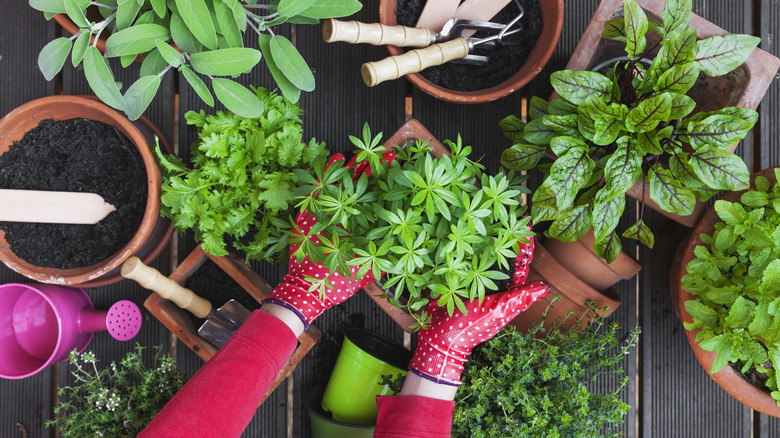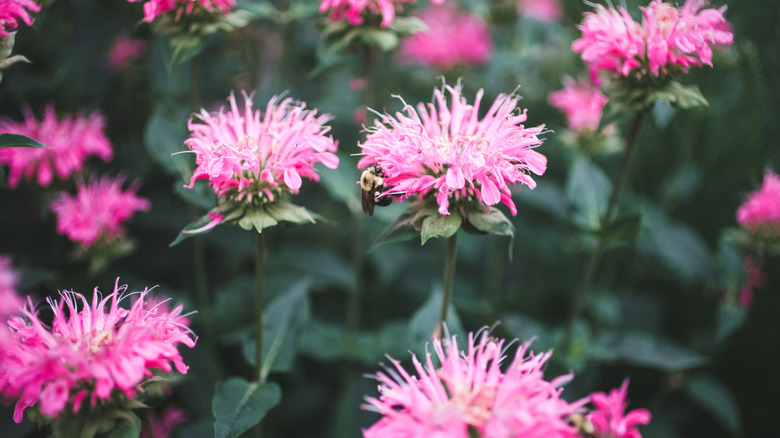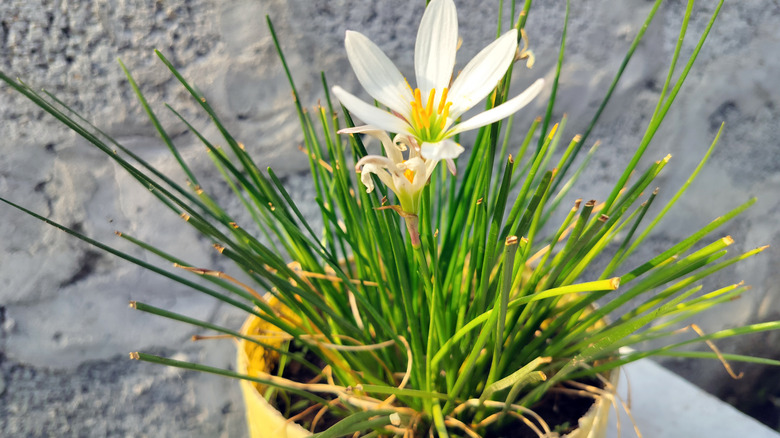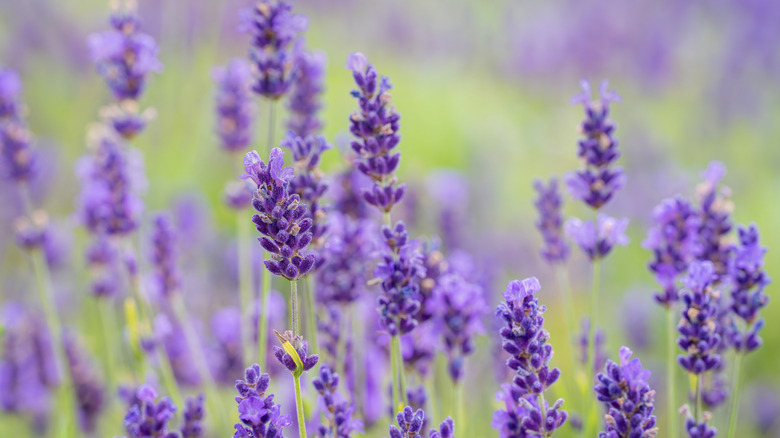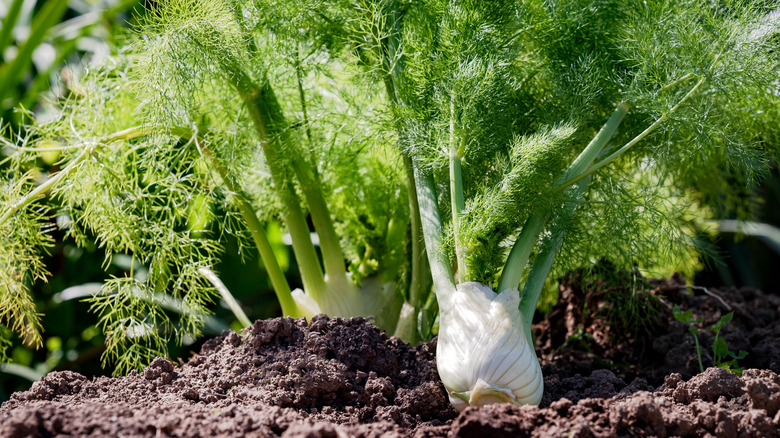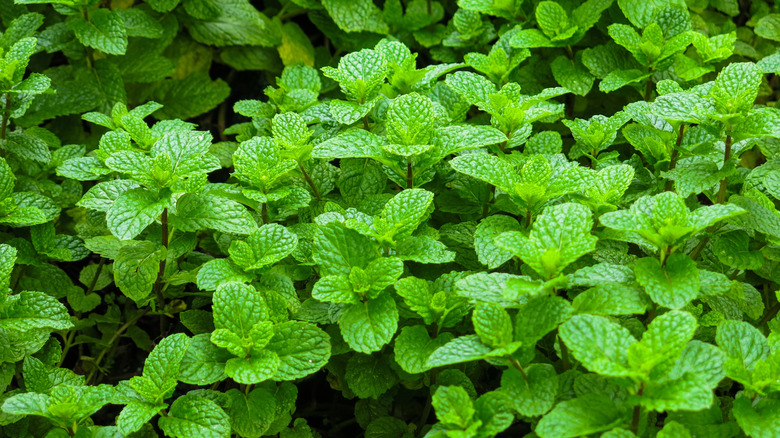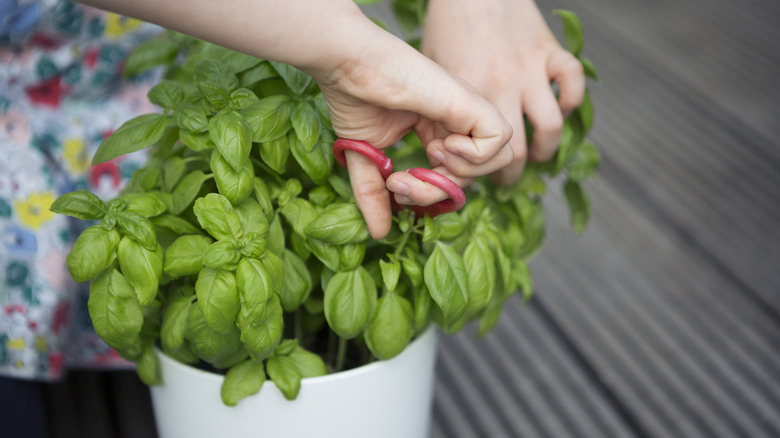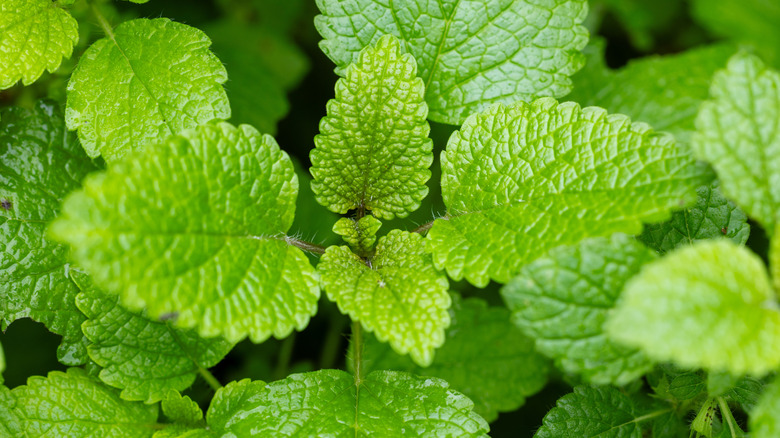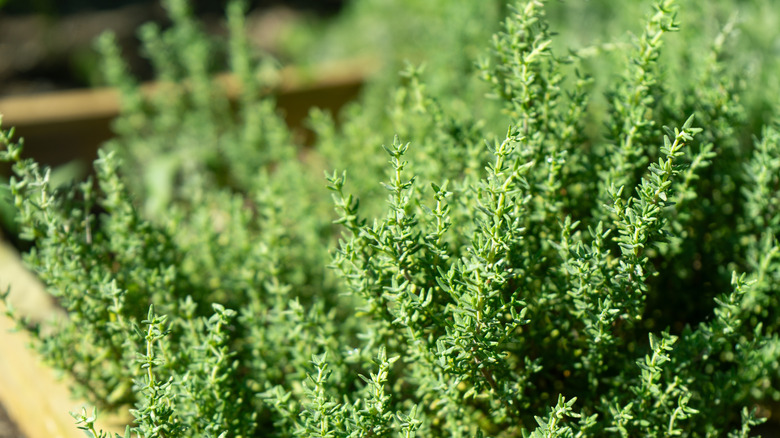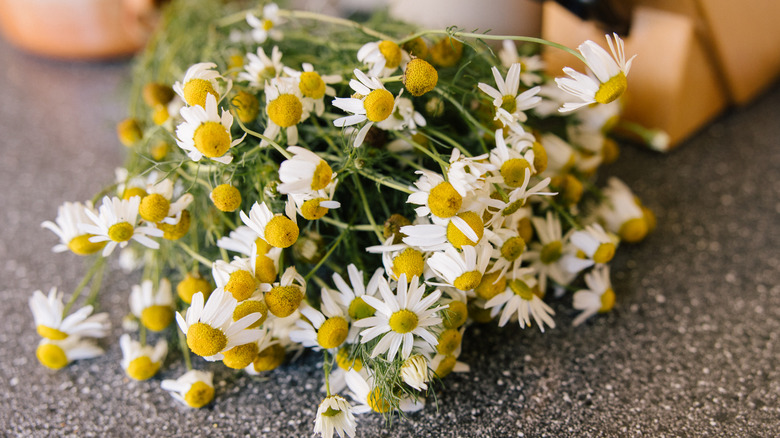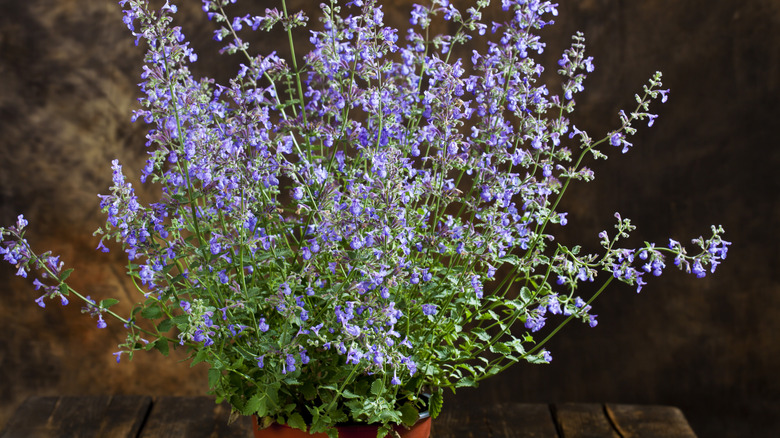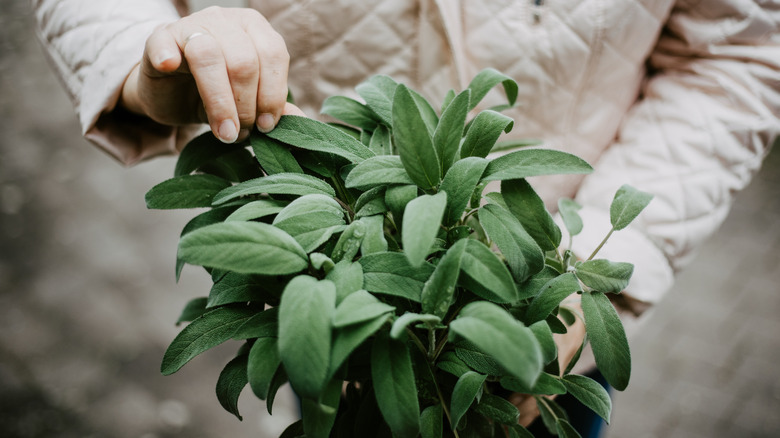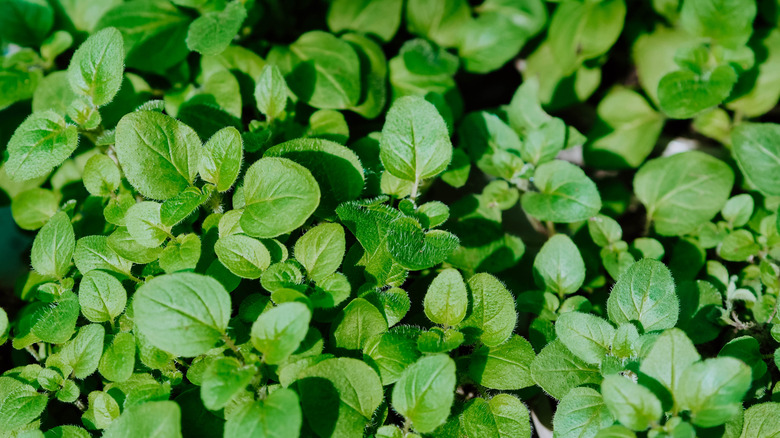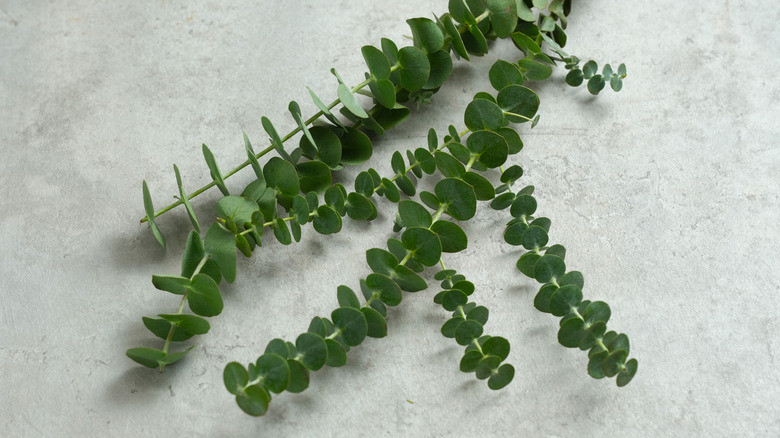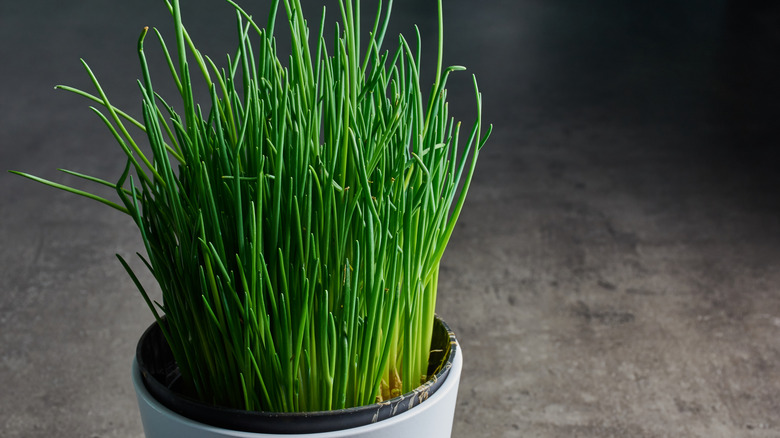14 Easy-To-Grow Herbs That Help Keep Mosquitoes Out Of The Yard And Garden
Fresh, aromatic herbs can add beauty and intrigue to your home garden, but growing your own herbs at home can also provide additional, lesser-known benefits. In addition to culinary and homeopathic advantages, being intentional about the herbs you plant in your garden can also aid in deterring annoying and potentially sinister pests. Not only can pests pose a risk to other plants in your yard, but they can also be dangerous to you and your loved ones, particularly mosquitoes, which are infamous for spreading viruses and disease through their bites. According to the CDC, mosquitoes are even considered the world's deadliest animals.
Thankfully, there are plenty of varieties of herbs that act as natural pest repellents and can help get rid of mosquitoes in your yard. Even the fragrance alone of certain herbs can be enough to deter mosquitoes from lingering around your garden, while other plants take it a step further, and contain volatile compounds that can actually confuse, disorient, or even kill the insect when they attempt to ingest the plant. Other herbs help to reduce the mosquito population in your garden by attracting the insects' natural predators, like friendly pollinators that feed on the pests, while encouraging a healthy amount of biodiversity.
A diverse herb garden has the potential to form a natural barrier against mosquitoes, allowing you some peace of mind when relaxing outdoors. But some varieties are more effective at keeping the insects at bay than others. Here are some of the best herbs that are easy to grow and can help prevent annoying mosquitoes from wreaking havoc around your yard.
Bee balm
Bee balm (Monarda didyma) is a fragrant flowering plant renowned for its ability to repel unwelcome pests, particularly mosquitoes. If you crush the leaves of a bee balm plant, it releases a distinct scent that repels the pest. However, bee balm's nectar can actually lure unsuspecting mosquitoes, who die after ingesting compounds in the nectar that are lethal to them. As the plant's name implies, bee balm also attracts helpful pollinators like butterflies, hummingbirds, and, of course, bees. This perennial grows best in USDA zones 3 to 9 and requires ample amounts of sunlight and consistent watering.
Lemon grass
Lemon grass (Cymbopogon citratus) is another popular flowering herb known to keep mosquitoes out of beloved gardens. The perennial plant is aptly named for its strong, citrusy scent, which masks the smells that pests like mosquitoes are attracted to. Lemon grass also contains citronella, an active ingredient that repels these insects. For smaller gardens, you can plant them in pots or containers, or you can line your yard with larger lemon grass plants for an extra layer of protection against pests. This tropical plant thrives in warm, humid climates and grows hardy in USDA zones 10 and 11.
Lavender
Not only is lavender (Lavandula) striking and aromatic, but it can also keep mosquitoes at bay. To humans, the distinctive scent of lavender is a popular choice of fragrance, but mosquitoes don't share the same sentiment. Linalool is an alcohol found in lavender plants that actively repels these insects, discouraging them from buzzing around your garden, disturbing the peace. Lavender flowers also attract pollinators like birds, butterflies, and dragonflies that prey on mosquitoes, thus reducing their population around your home. Lavender plants generally grow best in USDA hardiness zones 5 to 9, but some varieties can survive colder climates.
Fennel
Fennel (Foeniculum vulgare) is a perennial herb that boasts lush, flavorful fronds, but when planted in your garden, it can also act as a natural repellent to unwanted visitors. Mosquitoes simply can't stand the smell of fennel plants, discouraging them from hanging around your yard. Like lavender and bee balm, fennel can also attract pollinators, like ladybugs and hoverflies. You can grow happy, healthy fennel in USDA hardiness zones 4 through 9, in a sunny spot that receives full sunlight. Fennel plants do best during the fall season, but can also be planted in the spring.
Peppermint
Another versatile herb that can keep mosquitoes out of your yard is mint (Mentha), specifically the peppermint variety. Conveniently, mosquitoes also dislike the smell of fresh mint. Since the herb is fragrant and fast-growing, planting it in your garden beds can be an effective method of pest control. You don't need a green thumb to nurture a healthy mint plant; it's a beginner-friendly herb that requires full sunlight and well-draining soil. You can also grow it indoors, but note that the USDA hardiness zones for mint are 3 to 9.
Basil
Basil (Ocimum basilicum) almost needs no introduction. Most of us know basil as a classic herb that's a staple in kitchens across the globe; however, planting basil in your yard or garden can also help keep a mosquito problem under control. Multiple damaging compounds in basil extract cause mosquitoes to become confused, agitated, and vulnerable. Usually, this results in the insect steering clear of basil plants altogether. Basil is easy to grow and thrives in USDA hardiness zones 10 to 11, though some specific varieties can handle temperatures as cold as zone 4.
Lemon balm
Lemon balm (Melissa officinalis) is another member of the mint family that helps keep mosquitoes away. Compounds in lemon balm's oils repel mosquitoes, discouraging them from lingering and becoming a nuisance. Crushing a few of the plant's delicate leaves is the most effective way of repelling the dangerous pests, since it releases those compounds mosquitoes detest, like citronellol and citronellal. Lemon balm plants grow favorably in zones 4 to 10 and will thrive in the summertime when planted in areas that receive full sun. It's typically a straightforward and beginner-friendly herb to grow.
Thyme
Another popular herb that is effective at keeping mosquitoes out of your yard and garden is thyme (Thymus.) Some studies suggest that when you bruise thyme's fragrant leaves, it can be more effective at repelling mosquitoes than DEET, a popular insect repellent. Varieties like creeping thyme (Thymus Serpyllum) are particularly effective at keeping the pests at bay. The herb contains the compound carvacrol, which the insect hates. Thymol and carvacrol in thyme can confuse and disorient mosquitoes by interfering with the insect's receptors. Most varieties of thyme grow best in USDA hardiness zones 5 to 9.
Chamomile
While most of us are familiar with the benefits of chamomile (Matricaria chamomilla) tea, the fragrant herb is also efficient at driving mosquitoes away naturally with its sweet essential oils. Chamomile plants contain the active ingredient chamazulene, which deters mosquitoes with its prominent fragrance. Multiple varieties of chamomile can be effective in creating a barrier against persistent mosquitoes. The herb can also attract predators of the mosquito, like wasps, ladybugs, hoverflies, and bees. The fragrant, flowering herb is easy to grow and flourishes in USDA zones 2 to 9, but requires a minimum of four hours of sunlight.
Catnip
Catnip (Nepeta cataria) is famously a favorite of our beloved feline friends; however, a lesser-known benefit of the herb is its ability to repel mosquitoes. Scientists found that there is a compound called nepetalactone which can cause pain and itching in mosquitoes when they're exposed to it after catnip leaves are bruised. Catnip is another herb that is suspected to be even more effective than DEET at repelling annoying insects, and its presence in your garden can be enough to keep mosquitos away from surrounding areas. You can successfully grow catnip in zones 3 through 9.
Sage
Sage (Salvia officinalis) has a unique and prominent aroma that can discourage mosquitoes from invading your space. Sage plants contain compounds that mosquitoes find repulsive, like phenolic acids, terpenes, camphor, and flavonoids, which work together to repel the unwanted insects. For an additional layer of protection, you can harvest fresh sage to be burned, which is a highly effective repellent method. Sage has a reputation for being an extremely easy herb to grow and care for, and it thrives in USDA hardiness zones 4 to 10 during the summer in well-lit, sunny spots around the yard.
Oregano
Another common herb that's a staple in the kitchen but can also double as an insect repellent is oregano (Origanum vulgare). The oil found in oregano plants contains compounds like carvacrol, thymol, and terpenes, which naturally repulse mosquito populations. Just planting oregano plants around your yard can be enough to repel the insects and aid in protecting you and your loved ones from the harmful diseases or itchy bites that make mosquitoes notorious. This Mediterranean herb grows best in USDA hardiness zones 4 to 10 in full sunlight and is naturally resistant to diseases and other pests.
Eucalyptus
Eucalyptus is known for its medicinal benefits and for potentially aiding in relaxation. This therapeutic plant is also proficient in repelling insects, thanks to compounds in the plant's natural oils. Southern blue gum (Eucalyptus globulus) and lemon eucalyptus (Corymbia citriodora) have been studied and proven to discourage mosquitoes thanks to the compounds PMD and citronella. They are so effective in keeping pests away that you often find eucalyptus extracts in the ingredient list of natural bug sprays. Eucalyptus plants can thrive in your garden during summer months in USDA hardiness zones 8 to 11 in full sun and well-drained soil.
Chives
Finally, chives (Allium schoenoprasum) are another household staple that repels mosquitoes like magic. The smell of alliums is among the scents that mosquitoes can't stand and are repelled by, making chives a great natural insect deterrent that's easy to grow at home. Thiosulfate and saponins are compounds found in chives that are highly effective at keeping mosquitoes, along with other insects, out of your yard. This adaptable, pungent herb grows best in USDA hardiness zones 3-9 and can be successfully grown in environments that receive full sun or partial shade.
